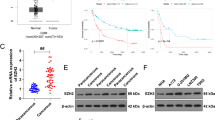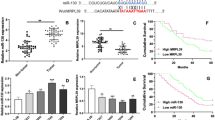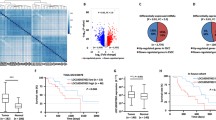Abstract
Gastric carcinoma (GC) is a prevalent malignant cancer worldwide and is highly lethal due to its fast growth. Hence, treatments to suppress GC cell growth may be applied together with surgery and chemotherapy to increase therapeutic outcome. Previous studies have shown the involvement of some microRNAs (miRNAs or miRs) in the carcinogenesis of GC, whereas a role of miR-132 in regulating the growth of GC has not been reported. Here, we report that overexpression of miR-132 in GC cells decreased FoxO1 protein levels, whereas depletion of miR-132 increased FoxO1 protein levels, without altering FoxO1 transcripts. Bioinformatics analyses showed that miR-132 bound to 3′-untranslated region (3′-UTR) of FoxO1 messenger RNA (mRNA) to prevent its translation, which was confirmed by luciferase reporter assay. Moreover, miR-132-mediated suppression of FoxO1 in GC cells resulted in a significant increase in GC cell growth in vitro and in vivo, while increases in FoxO1 by expression of antisense of miR-132 significantly decreased GC cell growth in vitro and in vivo. Finally, miR-132 levels were found significantly increased in GC specimens, compared to those in paired non-tumor gastric tissue. Together, our data suggest that miR-132 upregulation in GC cells may promote cell growth through suppression of FoxO1 translation.





Similar content being viewed by others
References
Wu W, Ding H, Cao J, Zhang W. FBXL5 inhibits metastasis of gastric cancer through suppressing Snail1. Cell Physiol Biochem. 2015;35:1764–72.
Attoub S, Karam SM, Nemmar A, Arafat K, John A, Al-Dhaheri W, et al. Short-term effects of oral administration of Pistacia lentiscus oil on tissue-specific toxicity and drug metabolizing enzymes in mice. Cell Physiol Biochem. 2014;33:1400–10.
Xu XY, Zhang LJ, Yu YQ, Zhang XT, Huang WJ, Nie XC, et al. Down-regulated MAC30 expression inhibits proliferation and mobility of human gastric cancer cells. Cell Physiol Biochem. 2014;33:1359–68.
Wang Y, Gao S, Liu G, Jia R, Fan D, Feng X. Microarray expression profile analysis of long non-coding RNAs in human gastric cardiac adenocarcinoma. Cell Physiol Biochem. 2014;33:1225–38.
Zhou X, Xia Y, Su J, Zhang G. Down-regulation of miR-141 induced by helicobacter pylori promotes the invasion of gastric cancer by targeting STAT4. Cell Physiol Biochem. 2014;33:1003–12.
Sankpal UT, Lee CM, Connelly SF, Kayaleh O, Eslin D, Sutphin R, et al. Cellular and organismal toxicity of the anti-cancer small molecule, tolfenamic acid: a pre-clinical evaluation. Cell Physiol Biochem. 2013;32:675–86.
Cui Y, Chen J, He Z, Xiao Y. SUZ12 depletion suppresses the proliferation of gastric cancer cells. Cell Physiol Biochem. 2013;31:778–84.
Zhao X, Li X, Yuan H. MicroRNAs in gastric cancer invasion and metastasis. Front Biosci. 2013;18:803–10.
Liu G, Jiang C, Li D, Wang R, Wang W. MiRNA-34a inhibits EGFR-signaling-dependent MMP7 activation in gastric cancer. Tumour Biol. 2014;35:9801–6.
Mao D, Zhang Y, Lu H, Zhang H. Molecular basis underlying inhibition of metastasis of gastric cancer by anti-VEGFA treatment. Tumour Biol. 2014;35:8217–23.
Ye Y, Zhou X, Li X, Tang Y, Sun Y, Fang J. Inhibition of epidermal growth factor receptor signaling prohibits metastasis of gastric cancer via downregulation of MMP7 and MMP13. Tumour Biol. 2014;35:10891–6.
Zhao Z, Han F, Yang S, Wu J, Zhan W. Oxamate-mediated inhibition of lactate dehydrogenase induces protective autophagy in gastric cancer cells: involvement of the Akt-mTOR signaling pathway. Cancer Lett. 2015;358:17–26.
Ge J, Chen Z, Huang J, Chen J, Yuan W, Deng Z, et al. Upregulation of autophagy-related gene-5 (ATG-5) is associated with chemoresistance in human gastric cancer. PLoS One. 2014;9:e110293.
Hosogi S, Kusuzaki K, Inui T, Wang X, Marunaka Y. Cytosolic chloride ion is a key factor in lysosomal acidification and function of autophagy in human gastric cancer cell. J Cell Mol Med. 2014;18:1124–33.
Liu M, Li CM, Chen ZF, Ji R, Guo QH, Li Q, et al. Celecoxib regulates apoptosis and autophagy via the PI3K/Akt signaling pathway in SGC-7901 gastric cancer cells. Int J Mol Med. 2014;33:1451–8.
Tang C, Yang L, Jiang X, Xu C, Wang M, Wang Q, et al. Antibiotic drug tigecycline inhibited cell proliferation and induced autophagy in gastric cancer cells. Biochem Biophys Res Commun. 2014;446:105–12.
Di Leva G, Croce CM. Mirna profiling of cancer. Curr Opin Genet Dev. 2013;23:3–11.
Pereira DM, Rodrigues PM, Borralho PM, Rodrigues CM. Delivering the promise of miRNA cancer therapeutics. Drug Discov Today. 2013;18:282–9.
Sicard F, Gayral M, Lulka H, Buscail L, Cordelier P. Targeting miR-21 for the therapy of pancreatic cancer. Mol Ther. 2013;21:986–94.
Tavano F, di Mola FF, Piepoli A, Panza A, Copetti M, Burbaci FP, et al. Changes in miR-143 and miR-21 expression and clinicopathological correlations in pancreatic cancers. Pancreas. 2012;41:1280–4.
Ali S, Ahmad A, Banerjee S, Padhye S, Dominiak K, Schaffert JM, et al. Gemcitabine sensitivity can be induced in pancreatic cancer cells through modulation of miR-200 and miR-21 expression by curcumin or its analogue CDF. Cancer Res. 2010;70:3606–17.
Zhou X, Ye F, Yin C, Zhuang Y, Yue G, Zhang G. The interaction between miR-141 and lncRNA-H19 in regulating cell proliferation and migration in gastric cancer. Cell Physiol Biochem. 2015;36:1440–52.
Chen Q, Qin R, Fang Y, Li H, Liu Y. A functional variant at the miR-214 binding site in the methylenetetrahydrofolatereductase gene alters susceptibility to gastric cancer in a Chinese Han population. Cell Physiol Biochem. 2015;36:622–30.
Wang QX, Zhu YQ, Zhang H, Xiao J. Altered miRNA expression in gastric cancer: a systematic review and meta-analysis. Cell Physiol Biochem. 2015;35:933–44.
Gross DN, van den Heuvel AP, Birnbaum MJ. The role of FoxO in the regulation of metabolism. Oncogene. 2008;27:2320–36.
Coronnello C, Benos PV. ComiR: combinatorial microRNA target prediction tool. Nucleic Acids Res. 2013;41:W159–164.
Song W, Li Q, Wang L, Wang L. Modulation of FoxO1 expression by miR-21 to promote growth of pancreatic ductal adenocarcinoma. Cell Physiol Biochem. 2015;35:184–90.
Chang YW, Zhao YF, Cao YL, Gu XF, Li ZQ, Wang SQ, et al. Liver x receptor alpha inhibits osteosarcoma cell proliferation through up-regulation of FoxO1. Cell Physiol Biochem. 2013;32:180–6.
Acknowledgments
This work was supported by Research project of Shanghai University of Traditional Chinese Medicine (2014YSN68).
Conflicts of interest
None
Author information
Authors and Affiliations
Corresponding author
Additional information
Wei Li and Jixun Zhang contributed equally to this work.
Rights and permissions
About this article
Cite this article
Li, W., Zhang, J., Chen, T. et al. miR-132 upregulation promotes gastric cancer cell growth through suppression of FoxO1 translation. Tumor Biol. 37, 15551–15557 (2016). https://doi.org/10.1007/s13277-015-3924-y
Received:
Accepted:
Published:
Issue Date:
DOI: https://doi.org/10.1007/s13277-015-3924-y




